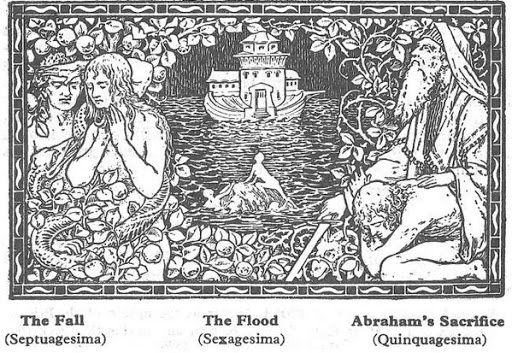Posted on February 16, 2020 View all news
Laudetur Jesus Christus! Gelobt sei Jesus Christus! Sia lodato Gesù Cristo! Praised be Jesus Christ!
Today we continue with our season of Septuagesima. This is a reminder to us that we are prepar- ing for the holy season of Lent, which is quickly approaching. Ash Wednesday is now just a week and a half away! During this season of Septuagesima, the ‘carnival’ is celebrated. This includes events like Bockfest, the idea of the pancake, and other more celebratory and tasty things. This was done as a way to purify the home of things people did not want around during Lent.
May we also use this time as a period to begin to remove from us the things we will be giving up as a penance. Lent is a period of penance, to first of all separate us from our attachments to earth but also to participate in the passion of the Lord. May we use this time wisely for our sanctification, so that we may be found to be worthy of God in the life to come. Have a blessed week ahead!

“The Season, upon which we are now entering, is expressive of several profound mysteries. But these mysteries belong not only to the three weeks, which are preparatory to Lent; they continue throughout the whole period of time, which separates us from the great Feast of Easter. The number seven is the basis of all these mysteries. We have already seen how the Holy Church came to introduce the season of Septuagesima into her Calendar. Let us now meditate on the doctrine hid under the symbols of her Liturgy. And first, let us listen to St. Augustine, who thus gives us the clue to the whole of our Season’s mysteries. “There are two times,” says the Holy Doctor: “one which is now, and is spent in the temptations and tribulations of this life; the other which shall be then, and shall be spent in eternal security and joy. In figure of these, we celebrate two periods: the time ‘before Easter’ and the time ‘after Easter.’ That which is ‘before Easter,’ signifies the sorrow of this present life; that which is ‘after Easter,’ the blessedness of our future state. *Hence it is, that we spend the first in fasting and prayer; and in the second, we give up our fasting, and give ourselves to praise.”
The Church, the interpreter of the Sacred Scriptures, often speaks to us of two places, which correspond with these two times of St. Augustine. These two places are Babylon and Jerusalem. Babylon is the image of this world of sin, in the midst whereof the Christian has to spend his years of probation; Jerusalem is the heavenly country, where he is to repose after all his trials. The people of Israel, whose whole history is but one great type of the human race, was ban- ished from Jerusalem and kept in bondage in Babylon.
Now, this captivity, which kept the Israelites exiles from Sion, lasted seventy years; and it is to express this mystery, as Alcuin, Amalarius, Ivo of Chartres, and all the great Liturgists tell us, that the Church fixed the number of Seventy for the days of expiation…” – Dom Prosper Guéranger
Read More: http://www.liturgialatina.org/lityear/septuagesima/sep- tua2.htm
